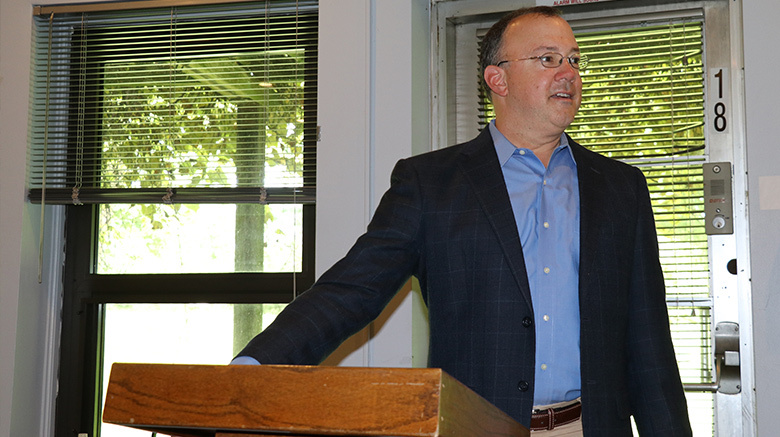Stephen Rockwell, Ph.D., values quality and experience. Especially when it comes to politics.
“The risk of the Trump presidency is that this is a long line of presidents where their experience level continues to trend downwards,” Dr. Rockwell said. “We continue to hire people with less and less experience to be president.”
Rockwell noted Trump’s inexperience in office compared to Barack Obama’s relatively short run in the U.S. Senate, and George W. Bush and Bill Clinton’s minimal governorships.
“None of these people are anywhere near the level of preparation of an (John Quincy) Adams or a (William) Taft or even (Ulysses) Grant,” Dr. Rockwell said.
Those three presidents were Dr. Rockwell’s subjects of note for his Sept. 12 lecture, “Recognizing the Next Good President,” the first liberal arts colloquium of the Fall 2017 semester, held in O’Connor Hall’s Shea Conference Center.
People tend to think of Adams, Taft and Grant as weak. But these presidents were willing to be creative, willing to be innovative, willing to push the envelope.”
Among students, staff and fellow faculty, the SJC Long Island political science professor attested that while most Americans rightfully laud the great presidencies of Washington, Lincoln, and Franklin Roosevelt, there is a tendency to overlook good presidencies that fall between greatness and failure.
“People tend to think of Adams, Taft and Grant as weak,” Dr. Rockwell said. “If you think that collaborating and working together with institutions across party lines is weak, then perhaps. But these presidents were willing to be creative, willing to be innovative, willing to push the envelope.”
The discussion was part of Dr. Rockwell’s upcoming book project “The Good Presidency: Ethics and Achievement in the Taft, Grant and John Quincy Adams Administration.” Dr. Rockwell was provided a summer grant by St. Joseph’s College to expand his research into his work. It’s research he says was invaluable toward his assessment.
Dr. Rockwell notes the following three qualities of a good president: 1. A deep background in public service; 2. An understanding of the context of the presidency; and 3. Recognizing that the presidency is a brief moment in their life.
“(Taft, Grant and Adams) all seem to recognize that to do this right takes a while. It takes a lot of compromises,” Dr. Rockwell said. “They understood the institutional balance, and all three give strong evidence of a personal level of respect and decorum that values the ability to work with people. People who disagree with their ideas. Which is something we don’t always see amongst presidents.”
All three give strong evidence of a personal level of respect and decorum that values the ability to work with people. People who disagree with their ideas. Which is something we don’t always see amongst presidents.”
Dr. Rockwell compared the American voter’s predilection toward leaders with diminishing experience to having our home’s roof blown off and consequently hiring less and less qualified roofers. Then hiring a policeman before finally settling on a 4-year-old.
The question of how a presidential candidate secures his party’s nomination was also a topic of discussion.
“The one thing that starts to occupy my mind is whether we really did make a huge mistake when we started to make the presidential nominating process a process of popular vote,” Dr. Rockwell said. “My three presidents were all chosen from within the party and caucus systems. Where the party is able to say ‘Who do we trust and respect, can get stuff done? Who do we know that can work with the other side?’”

